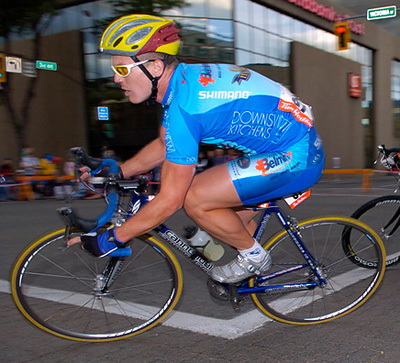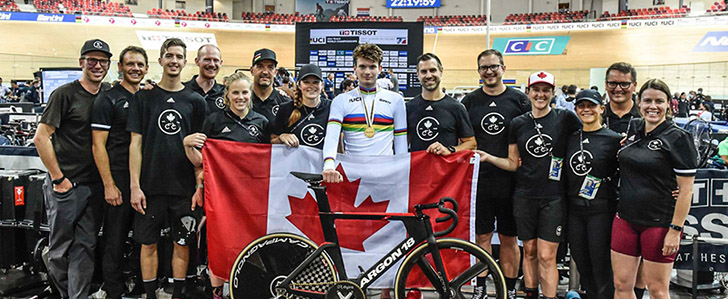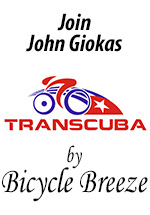March 15/08 6:18 am - The Hansen Interview: Nat Faulkner
Posted by Editor on 03/15/08
Nat Faulkner - Cyclist To Adventurer To Triathlete
by Matt Hansen
"Hi I'm Nat I'm a vagabond. I travel the world on my bike. I race. I tour. I sleep on couches." - From Faulkner's website.
If you've been in road cycling in Ontario, BC, or the domestic U.S. scene awhile, it's quite possible you've run into Nat Faulkner. I once described Svein Tuft - the journeyman bike tourist, camper, ultimate fighting guru cum road cyclist, as something out of a Jack Kerouac Novel. Nat Faulkner IS the novel.
Nat is constantly on the go, whether it's bike touring to Alaska, Guatemala, Northern Ontario, or living out of his car in the Southern US in order to keep his fitness up. He is a survivor. Faulkner, who won the Junior Nationals a decade ago, was pegged to be one of the "next big things." And he's lived up to that promise ... off and on.
Faulkner rode with both of the Ontario pro teams - Jet Fuel and Italpasta - winning races on both the west and east coasts in Canada and the US. He has taken provincial titles and scored medals and top placings at the Senior or U23 Nationals.

Nat Faulkner at the 2005 Road Nationals
However, after a few seasons racing and touring his bike all over North and South America, the Bracebridge-born 29-year-old finds himself with a new but old challenge: triathlon. Although Faulkner did race (and win) the Kids of Steel triathlon series in both Canada and the US as a junior, it's been a long time since he's done the triple training. I caught up with him and found out what one of the most interesting characters in cycling I've ever met is currently up to.
Matt Hansen: So, how did you get into cycling, anyway?
Nat Faulkner: I have always been bike obsessed. My first big crash was the same day as the first time my parents allowed me on the road. Later that summer (aged 4) I rode 10 km. All on the gravel roads surrounding Kitchener, Ontario.
Our family got into bike touring, and triathlon racing around the same time, and in 1996 I started road racing. I won the National Junior TT championships that year, 4th in the road race, and a week later I flew to Austria to start a Rotary Exchange. I got on the local cycling team, which allowed me to do training camps in Switzerland, and Italy, as well as racing the Peace Race in the Czech Republic. One of my team-mates, Gerrit Glomser, has been top-10 in Tour Stages.
That was in 1996, the 'height' of the doping years, so the races were really exciting, but I got my first glimpses of the blacker side of the sport. From then on I was pretty happy to do more racing on our continent. That said, there is nothing like riding through a small European village on cobbled streets 8 feet wide, with crowds of people yelling at you from the sidewalk. Looking up the houses actually overhang the road, and there are more people looking down on you, yelling.
MH: What about bike touring? When did you do your first bike tour, and where?
NF: My father packed up the family when I was 10 and my brother was 7, and we drove to PEI (before there was a bridge) and spent around 10 days riding our bikes around the island. The next year I think we had 3 or 4 week long family bike tours, the last one being a week of cold rain riding through the Gatineau hills. Because it was late in the year, all campgrounds were closed, and we had to rough it, essentially.
The following 2 years we did 2 month-long trips in Europe, again as a family.
MH: So what was the coolest trip?
NF: For 6 years I took road racing really seriously. Migrating to follow the sun, and race schedule. In 2005, my team [Italpasta] ended up not paying me, and it seemed like I had been doing the same races for a long time. That fall I decided to bike tour south and see how far I could get. It was my first bike tour over a week since I was 14. Also the unknown of going into central America, not speaking any Spanish, and the unknown made it a little scary, and really exciting.
In the end my mother was worried for me, so to have a traveling companion, I ended up doing riding with my Dad. We hadn't always seen eye to eye, so we have a much better relationship now than the previous years. I doubt it's often said on a deathbed that someone spent too little time with their parents, we're both really glad to have done this.
In 2007 my father and I headed north to ride the Dempster Hwy to Inuvik (farthest north reaching road in Canada - and it's dirt). This tour was also just great, but it was disappointing to see the state of affairs of our native population. When people are living in dirt in Mexico they were proud, and working hard to get places. Up north in Canada the majority of the people had little motivation for doing anything. The more we talked to the locals, the more complicated the situation seemed, and vaguer the solutions became. Inuvik's community greenhouse (www.cityfarmer.org/inuvik.html) was one really positive thing, and there were a group of Newfie Teachers making a big difference in the Community of Ft. McPherson NWT as well.
To sum up, the coolest thing is the random situations, and people you come in contact with and share amazing experiences with because you, your vulnerability, and accessibility of bike touring
MH: What does it feel like to be on the road, self-sufficient?
NF: It's probably one of the greatest thing about bike touring. Being compact, and literally having the ability to go anywhere in the world. Essentially, I can survive indefinitely from a 70 lb BOB trailer, and my own energy.
My 84-day trip through central America cost only $9 per day. After working a month last summer, I cashed my pay cheque, and realized that I had just earned enough money to bike tour for 6 months.
MH: So, what was the craziest thing ever happened on bike tour?
NF: Riding two and a half months through Mexico, Guatemala, to Panama, and not speaking Spanish at the start, almost everyone was convinced we would be robbed. Riding north to Inuvik this Spring, we were told that we would have bear troubles. I guess the craziest thing is that nothing threatening ever happened.
MH: So you're back in the tri-scene. How did this all happen?
NF: Before cycling, my first sport I was truly passionate about was triathlon. I remember eating up ever word of the second-hand triathlon magazines in my youth. (Note: at age 13 Nat was both Canadian and US Triathlon Champion)
Because I got into road racing at 17, I didn't get to do a lot of the races I had dreamed about doing - Muskoka, Alcatraz, St. Croix. I started swimming last August, while I was working for a dog walking company. The first 3 times in the water, my arms cramped up in fewer than 25 metres from the dock. By the end of September I got in contact with my old Triathlon coach, Barrie Shelpley (who was the Olympic Triathlon coach in 2000 when Simon Whitfield won gold) for advice.
Next thing I knew I was part of his elite team: C3. (www.c3online.ca/index.shtml). There is no National Training Center in Ontario, so C3, which is privately funded, has filled that void. I am also working doing cycling drills, and clinics for Personal Best Coaching (personalbest.ca/) in exchange for my own coaching. Also I have been linked up with Sean Bechtel, one of the alternates for Team Canada at the Beijing Games, and we have been getting in some great workouts.
MH: I guess we all want to know what's different in the training, besides the obvious. What's harder? What's different?
NF: There are three main differences between cycling and triathlon. The first is the logistics of doing 3 sports. A few of our seven-plus hour training days have actually taken 14 hours from when we leave the house to our return. The combination of running and riding rips up my calves, so I have to spend a lot more time stretching, and doing muscle release with a foam roller, so that I am able to train the next day. Massages are also much more important for this as well.
I have also been training a lot of hours. Partially because I am focusing on the half ironman distance, and partially because I am trying to establish a swimming and running base after being away from those sports for 14 years.
The final thing, is that I have upper body muscle. It trips me out, looking in the mirror, to see meat on my arms, and lat muscles. It really is exciting after all those years of being legs only.
Technically, I have a long way to go on my swimming, but having good coaches really is helping this. Also, fortunately the swim is the shortest event, so I will only be losing 3-4 minutes. The run, being the last event is paramount - because if I'm going to melt down this is where it will happen.
I have just wrapped up my base month (February) on Sunday, in Tucson. It will be really close to 145 hours, which is massive. From here Sean and I will drive over to Florida for 2 months of training focusing on getting faster. It's hard to know exactly how I will do, but from a few of the faster workouts we've done, I think that I will be going pretty quickly.
Triathlon is also a lot more expensive. I have signed up for 3 races so far, and they were $700 total in entry fees. Not to mention they are so far apart [that] flying and car rentals will all be added on. Bike racers start crying when an entry fee is over $35!
I couldn't end this interview without mentioning triathlon fashion. After getting heat stroke I was asking Sean if it was OK to run with a CamelBak filled with ice. His reply, was, "Nat as a Triathlete In Training (T.I.T.) there is nothing which is fashionably unacceptable."
I also have to give a shout out to thank Gears bike shop, and Specialized for helping me out with a really sweet ride this year.
To follow some of Nat's adventure's check out his blog here: www.natbikes.com/.
| Return to Canadian Cyclist homepage | Back to Top |





